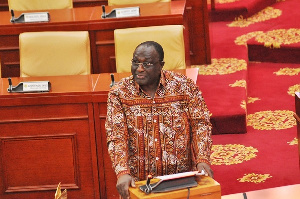 Minister for Trade and Industry of Ghana, Alan Kwadwo Kyerematen
Minister for Trade and Industry of Ghana, Alan Kwadwo Kyerematen
From tomorrow, September 1, 2021, Ghana will commence a series of tariff liberalization as part of measures to meet the requirements under the Ghana-UK Interim Trade Partnership Agreement (ITPA). The exercise will see Ghana reduce some tariffs on goods coming from the UK.
The Ghana-UK ITPA was ratified by the parliament of Ghana in May this year after the UK completed processes to exit the European Union (EU). The move provided an opportunity for the two countries to renegotiate new tariff regimes since the UK could no longer rely on the EU trade terms with its partners.
Ghana benefits from the treaty as vegetable and fruit exporters enjoy duty and quota-free access to the UK market for goods originating from the country.
“This is an important agreement because, without the ITPA, about two-thirds of Ghana’s non-traditional exports would have to face higher tariffs with the potential to suffocate Ghana’s fast-growing non-traditional exports,” Technical Advisor in charge of Multilateral, Regional and Bilateral Trade at the Ministry of Trade and Industry, Anthony Nyame-Baafi said.
Providing the details of the pact, Mr Nyame-Baafi said the agreement covers trade in goods and development cooperation and includes rendezvous clauses for future negotiations on services and other trade-related issues.
He explained that the agreement looks at all issues that could come up in modern trade treaties, such as trade defence mechanisms, technical barriers to trade, sanitary and phytosanitary measures, trade facilitation, and dispute settlement.
Describing the deal as beneficial to Ghana’s economy, Mr Nyame-Baafi maintained that Ghana would enjoy 100% duty-free quota-free market access to the UK for all imports from Ghana except arms and ammunition.
In fulfilling the agreement, he stated that Ghana is obliged to asymmetrically and progressively open 80% of the country’s market to UK goods, taking full account of the differences in levels of development between Ghana and the UK. “Ghana will also exempt 20% of sensitive and special imports products from the UK to Ghana,” he said.
Long term benefit of ITPA
Even though Ghana may lose some revenue in the tariff liberalization, Mr Nyame-Baafi, however, pointed out that the country will enjoy development cooperation and financial support in return from the UK.
He observed that the pact would also enable market access and export crucial for Ghana’s existing and potential exports diversification. “We should also not forget we will benefit from competitiveness of local industries due to the removal of tariffs on intermediary goods and machinery from the UK.”
He added that Ghana would be better off under the agreement as the general public will enjoy due to a reduction in the costs of many households’ consumption items imported from the UK.